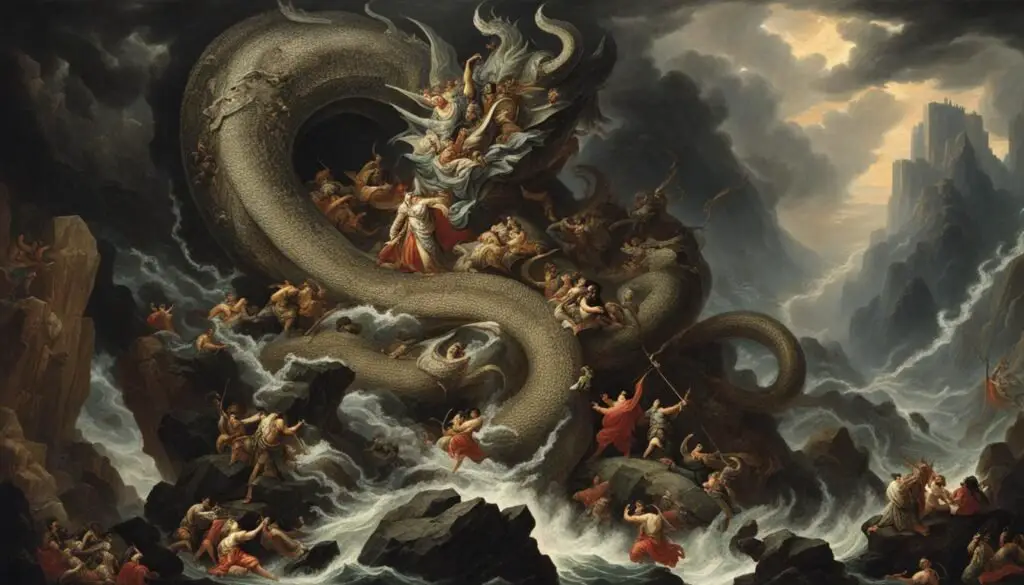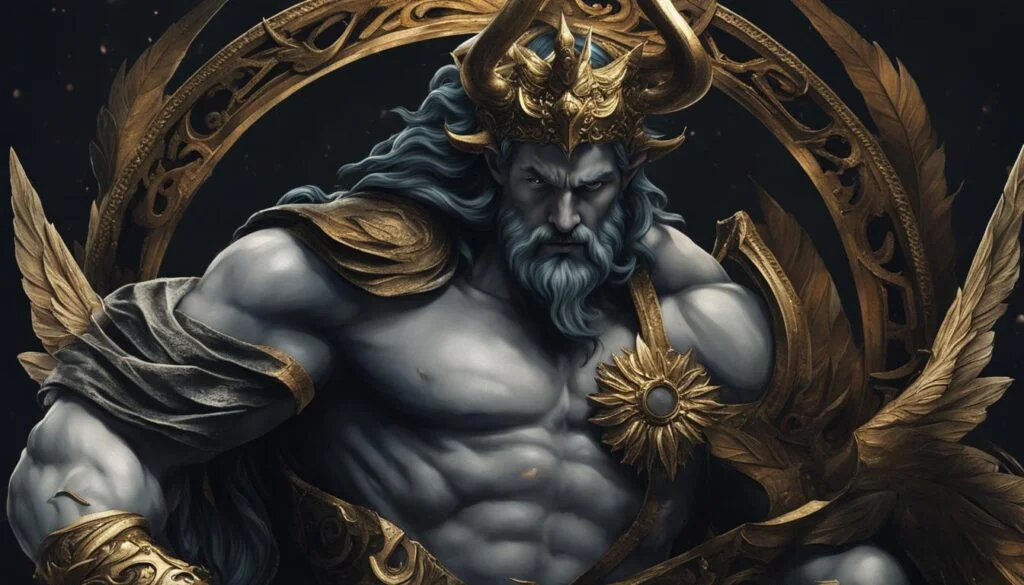Greek mythology is filled with captivating tales of gods and titans, each with their own unique roles and powers. One such figure is Cronus, the youngest and most powerful of the first generation of Titans. Today, we dive into the intriguing world of Cronus and explore his role in Greek mythology.
In Greek mythology, Cronus is known for his role as the god of time and age. He ruled during the Golden Age, a period of prosperity and abundance, after overthrowing his father Uranus. Often depicted with a sickle in hand, Cronus symbolizes the passage of time and the cyclical nature of life.
One of the most famous aspects of Cronus’ story is his fear of being overthrown by his own children. To prevent this, he swallowed each of them as they were born. However, his youngest son Zeus managed to escape this fate and grew up to lead the Olympians in a war against the Titans, ultimately defeating them.
Cronus was not only associated with time and age but also revered as a harvest deity. He oversaw the progression of seasons and the bountiful growth of crops. His castration of his father Uranus is another significant part of his mythological story, resulting in the birth of the goddess Aphrodite.
Key Takeaways:
- Cronus is the youngest and most powerful of the first generation of Titans in Greek mythology.
- He ruled during the Golden Age and is known as the god of time and age.
- Cronus feared being overthrown by his children and swallowed them at birth, except for Zeus.
- He is associated with the progression of seasons and the growth of crops as a harvest deity.
- His castration of his father Uranus led to the birth of the goddess Aphrodite.
Cronus’ Family and Kinship
In Greek mythology, Cronus was not only a powerful Titan god but also a significant figure within a complex family structure. He was the son of Uranus, the sky, and Gaia, the earth. Cronus had numerous siblings, including Rhea, Hyperion, Koios, Iapetus, Krios, Theia, Themis, Mnemosyne, Phoebe, Tethys, Oceanus, and Metis.
Cronus’s relationship with his family took a unique turn when he married his sister Rhea. Together, they had several children, including the renowned Zeus, Hera, Poseidon, Hades, Hestia, and Demeter. However, Cronus, driven by his fear of being overthrown, consumed each of his newborn children.
It was Zeus, his youngest son, who managed to escape Cronus’s fate by being hidden away and eventually led the charge against him. With Zeus’s help, the Titans were defeated, and Cronus was banished to Tartarus, marking the end of his reign as the ruler of the Titans.
The Power and Characteristics of Cronus

In Greek mythology, Cronus is revered as a formidable figure with immense power and unique characteristics. As a Titan god, he held dominion over his fellow Titans during their reign. Cronus embodied the essence of time and age, symbolizing the destructive force of the passage of time. He is often depicted holding a sickle, which served as both a weapon and an emblem of his authority.
One of the most notable aspects of Cronus’ power was his ability to manipulate time. He controlled the progression of time and the aging process, highlighting his influence over the cyclical nature of life. Cronus’ association with time also reflects the cyclical nature of history, where one generation gives rise to the next.
The Instrument of His Power: The Sickle
The sickle held by Cronus is more than a mere tool. It is a symbol of his authority and an embodiment of his power. With this weapon, Cronus castrated his father Uranus, overthrowing the previous generation and establishing his own dominion. This act of violence marked the beginning of a new era, where Cronus and his siblings held sway.
Furthermore, Cronus was revered as a harvest deity, overseeing the abundance of crops and the progression of seasons. He was associated with the Golden Age, a time of prosperity and harmony. During this era, Cronus ensured the bountiful availability of resources and fostered an environment of abundance.
Summary:
- Cronus possessed immense power as a Titan god.
- His control over time and aging symbolized the cyclical nature of life.
- The sickle was not only a weapon but also an emblem of his authority.
- Cronus’ castration of Uranus marked the beginning of a new era.
- He was associated with the Golden Age and oversaw the abundance of crops and the progression of seasons.
Cronus and the Golden Age
Cronus played a significant role in the mythological concept of the Golden Age. According to Greek mythology, the Golden Age was a time of peace, prosperity, and harmony among all people. It was a period when the earth was abundant with resources and there was no need for laws or rules. Cronus, as the ruler during this time, was associated with the bountiful and virtuous qualities of the Golden Age.
Under Cronus’ rule, the Titans and the gods brought about a time of great prosperity and abundance. The land flourished, and the people lived in harmony, free from conflict and suffering. It was a time of golden harvests, mild weather, and an overall sense of tranquility.
The Virtues of the Golden Age:
- Peace and harmony among people
- Abundance of resources
- Prosperous harvests
- Mild and favorable weather conditions
- Lack of conflict and suffering
However, this Golden Age eventually came to an end with the rise of Zeus and the Olympians. With the defeat of Cronus and the Titans, a new era of gods was ushered in, marking the transition to a different cycle of time and the beginning of a new age.
Conclusion
In Greek mythology, Cronus played a significant role as a powerful Titan god. He ruled over the Titans during the Golden Age, a time of prosperity and abundance. Cronus was associated with time, age, and agriculture, and his mythological story showcases his diverse attributes.
Cronus is famously known for swallowing his own children out of fear that they would overthrow him. However, his youngest son Zeus managed to escape this fate and led the Olympians in a war against the Titans, ultimately defeating them and banishing them to Tartarus.
Although often overshadowed by Zeus and the other gods, Cronus’ role in the Golden Age cannot be overlooked. He symbolized the bountiful and virtuous qualities of this era, which came to an end with the rise of the Olympians and a new cycle of time. Cronus’ story serves as a reminder of the complex and intricate mythology that has captivated generations.
FAQ
What was Cronus’ role in Greek mythology?
Cronus was the youngest and most powerful of the first generation of Titans. He ruled during the Golden Age, was the god of time and age, and was associated with the progression of time. He is known for his role as a harvest deity and for swallowing his children out of fear of being overthrown.
Who were Cronus’ siblings and family?
Cronus was the son of Uranus and Gaia. His siblings included Rhea, Hyperion, Koios, Iapetus, Krios, Theia, Themis, Mnemosyne, Phoebe, Tethys, Oceanus, and Metis. He married his sister Rhea, and together they had several children, including Zeus, Hera, Poseidon, Hades, Hestia, and Demeter.
What were Cronus’ power and characteristics?
Cronus was a powerful Titan god who ruled over the Titans during their reign. He possessed god-like abilities and was associated with time and age. Cronus also had a formidable weapon, a sickle, which he used to castrate his father Uranus. He was worshipped as a harvest deity and symbolized the destructive nature of the passage of time.
How was Cronus associated with the Golden Age?
In Greek mythology, the Golden Age was a time of peace, prosperity, and harmony. Cronus ruled during this time and was associated with the bountiful and virtuous qualities of the Golden Age. The Titans and the gods under Cronus’ rule were believed to have brought about a time of great prosperity and abundance.
What is the mythological story of Cronus?
Cronus is known for castrating his father Uranus, which led to the birth of Aphrodite. He also swallowed each of his children out of fear that they would overthrow him. However, his youngest son Zeus managed to avoid being consumed and eventually led the Olympians in a war against the Titans, defeating them and banishing them to Tartarus.




